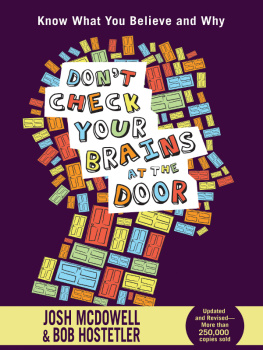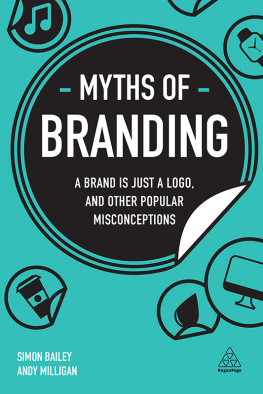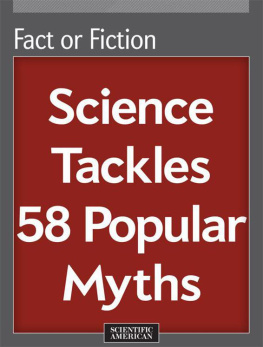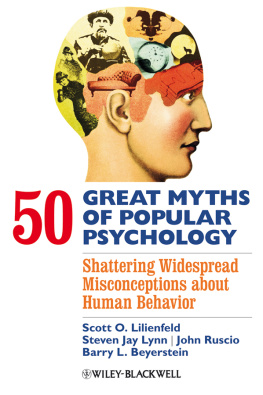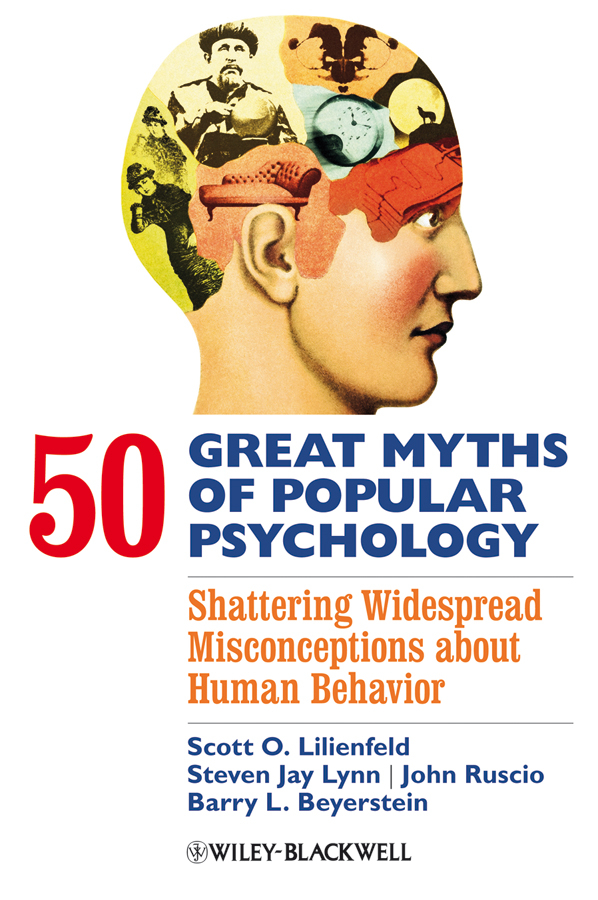
Praise for 50 Great Myths of Popular Psychology
True knowledge is hard won, and this timely and remarkable book shows us that stamping out falsehoods is no easy task either. The book does it all: it debunks all-too-common beliefs from the pseudoscientific fringe; it presents evidence against a variety of myths that seem like they ought to be true; it explains why people fall prey to such falsehoods; and it ends with some tantalizing facts about mind and behavior that make it clear that the truth can be every bit as amazing as fiction. These 50 myths wont disappear with the publication of this book, but those who read it will enjoy being able to set othersmany othersstraight.
Thomas Gilovich, Cornell University
We have needed this compendium for some time. These factoids and popular (but fallacious) memes about psychology have been exposed in single publica tions, but critiques of all of them have never been brought together in one place before. The myths chosen by these authors are indeed popular onesthe very ones that psychology instructors encounter every day. The book is an incredible resource for both student and instructor. The critiques are accurate and well written. Im sure my copy will be dog-eared within six months.
Keith E. Stanovich, author of How To Think Straight About Psychology and What Intelligence Tests Miss
A much-needed mythbuster for consumers and students of psychology. This engaging book reminds us that applying science to everyday psychology is not only enormously worthwhile, but fun.
Carol Tavris, coauthor of Mistakes Were Made (But Not by Me)
Because I only use 10% of my brain, I had to play Mozart music while read ing this book, and then be hypnotized to recover the memory of it because of early childhood traumas that were repressed but occasionally leaked through out-of-body experiences and ESP. And if you believe any of the above you need to read this book twice if its mythbusting revelations cause you to repress the memory of it.
Michael Shermer, Publisher of Skeptic magazine, monthly columnist for Scientific American, and author of Why People Believe Weird Things
Is it true that psychology is mostly common sense? For anyone who wonders, this amazing bookwhich effectively discounts 50 pop psychology myths and briefly dismisses 250 moreprovides convincing answers. And it does more: it offers fascinating examples of how science works and supports critical think ing. For teachers, students, writers, and anyone who wants to think smarter, this classic-to-be will be a valuable resource and a great read.
David G. Myers, Hope College, author of Intuition: Its Powers and Perils
I find each and every chapter excellent and from a teaching point of view, bril liant. The way in which the history of the myths is presented up to the critical but balanced discussion of each myth, is a great achievement. Scott Lilienfeld is well-known for his user-friendly writing style, but in this text he and his co authors reach a new level. This leads to a book which will not only be easily understandable by undergraduate, and especially first year students, but also by the general population.
Dap Louw, University of the Free State
About the Authors
Scott O. Lilienfeld is a Professor of Psychology at Emory University in Atlanta. Author of over 200 journal articles, chapters, and books, he is a recipient of the 1998 David Shakow Early Career Award for Distinguished Contributions to Clinical Psychology from Division 12 (Society for Clinical Psychology) of the American Psychological Associ ation (APA). He is a past president of the Society for a Science of Clinical Psychology and a Fellow of the Association for Psychological Science. He is editor of the Scientific Review of Mental Health Practice. Dr. Lilienfelds principal areas of research are personality disorders, psychi atric classification and diagnosis, pseudoscience in mental health, and the teaching of psychology.
Steven Jay Lynn is a Professor of Psychology and Director of the Psy chological Clinic at the State University of New York at Binghamton. Dr. Lynn serves on 11 editorial boards, and he has 270 scholarly pub lications, including 16 books. He is past President of APAs Division of Psychological Hypnosis, and he has been the recipient of the Chan cellors Award of the State University of New York for Scholarship and Creative Activities. He is a fellow of the APA and the Association for Psychological Science, and his research has been funded by the National Institute of Mental Health. His major areas of research include hypnosis, memory, fantasy, and dissociation.
John Ruscio is an Associate Professor of Psychology at The College of New Jersey. His scholarly interests include quantitative methods for psychological research and the characteristics of pseudoscience that distinguish subjects within and beyond the fringes of psychological science. He has published more than 50 articles, chapters, and books, including Critical Thinking in Psychology: Separating Sense from Nonsense; serves on the editorial boards of the Journal of Abnormal Psychology and Psychological Assessment; and is an associate editor at the Scientific Review of Mental Health Practice.
The late Barry L. Beyerstein was Professor of Psychology at Simon Fraser University and chair of the British Columbia Skeptics Society. He was co-editor of The Write Stuff (1992), Associate Editor of the Scientific Review of Alternative Medicine, and co-authored many art icles in the Skeptical Inquirer and professional journals. Dr. Beyerstein was a member of the Advisory Board of the Drug Policy Foundation (Washington, DC) and a founding board member of the Canadian Foundation for Drug Policy (Ottawa, Ontario).
This edition first published 2010
2010 Scott O. Lilienfeld, Steven Jay Lynn, John Ruscio, and Barry L. Beyerstein
Blackwell Publishing was acquired by John Wiley & Sons in February 2007. Blackwells publishing program has been merged with Wileys global Scientific, Technical, and Medical business to form Wiley-Blackwell.
Registered Office
John Wiley & Sons Ltd, The Atrium, Southern Gate, Chichester,
West Sussex, PO19 8SQ, United Kingdom
Editorial Offices
350 Main Street, Malden, MA 02148-5020, USA
9600 Garsington Road, Oxford, OX4 2DQ, UK
The Atrium, Southern Gate, Chichester, West Sussex, PO19 8SQ, UK
For details of our global editorial offices, for customer services, and for information about how to apply for permission to reuse the copyright material in this book please see our website at www.wiley.com/wiley-blackwell.
The right of Scott O. Lilienfeld, Steven Jay Lynn, John Ruscio, and Barry L. Beyerstein to be identified as the author of this work has been asserted in accordance with the Copyright, Designs and Patents Act 1988.
All rights reserved. No part of this publication may be reproduced, stored in a retrieval system, or transmitted, in any form or by any means, electronic, mechanical, photocopying, recording or otherwise, except as permitted by the UK Copyright, Designs and Patents Act 1988, without the prior permission of the publisher.
Wiley also publishes its books in a variety of electronic formats. Some content that appears in print may not be available in electronic books.
Designations used by companies to distinguish their products are often claimed as trademarks. All brand names and product names used in this book are trade names, service marks, trademarks or registered trademarks of their respective owners. The publisher is not associated with any product or vendor mentioned in this book. This publication is designed to provide accurate and authoritative information in regard to the subject matter covered. It is sold on the understanding that the publisher is not engaged in rendering professional services. If professional advice or other expert assistance is required, the services of a competent professional should be sought.


